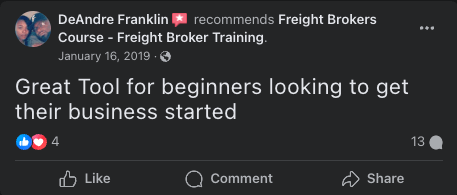Let Us Help You Find Your Course!
What Do You Want To Be?!
Add Audio Guide For $124
BASIC
Everything You Need To Start Your Box Truck Business!
Add Audio Guide For $99
BASIC PLUS
Everything You Need To Become a Box Truck Carrier
Add Audio Guide For $99
ADVANCED
Get All The Tools You Need
Add Audio Guide For $99
DELUXE
Get started creating your own Box Truck Business
BASIC
Everything You Need To Start
BASIC PLUS
Everything You Need To Know
ADVANCED
Includes All Three Formats
The numbers speak for themselves!
The industry continues to grow, and there are more and more tools available to help you be successful!
US Market Size (Billions):
US CAGR:
Broker Avg. Earnings (Thousands):
Agent Avg. Earnings (Thousands):
Online Freight Broker Training Pricing
With Packages starting as low as $99, you can learn the skills you need to be successful in the Transportation and Logistics Management as a Freight Broker/Agent with our online freight broker training courses.

As a leader in the online freight broker training industry, Freight Brokers Course.com has developed a Freight Brokerage License school for students to become independent contract agents or freight brokers. You can study anywhere at any time with our cutting edge Learning Management System. Register Today and start learning Instantly!
What Do People Say


Online Freight Broker Training Topics – Updated 2024
OUR LEARNING MANAGEMENT SYSTEM
Shows you everything you need to keep track of your progress and maximize your training time!

Unparalleled Student Support
Our diverse experience and 24/7 support will help you complete our online freight broker training course at whatever pace you would like and get your business up and running.
WHAT ARE YOU WAITING FOR?
Join thousands of people starting new careers in the 40 billion dollar freight brokerage industry every day!
Online Learning Managemnt System
We provide multiple course packages to meet all customer's needs and purposes.
Schedule A Walkthrough!
Which Course Are You Interested In?
Freight Broker FAQs
How Long Does the Training Take?
Answer: Our training is self paced and never expires so you can take as long or short as you want. However, most students complete the training in 2-3 weeks!
Is The Training Online?
Answer: Our training is 100% online and works on any device and is available in audio book, eBook, physical book or any website device.
Do We Get A License After Training?
Answer: We have partners that can help you get your Freight Broker Authority which is referred to as a license! We also have a guide to help you do it yourself!
What is the difference in being a Freight Broker or a Freight Broker Agent?
Answer: A broker is the owner of his or her own company. They are required to meet all legal requirements (Authority, Bond, BOC-3) to operate as a broker.
An agent works under the authority of the broker and typically receives a percentage of the brokerage fee.
Is there a need for more Freight Brokers in the industry?
Answer: U.S. Bureau of the Census County Business Patterns indicate that agricultural and manufacturing businesses are growing exponentially every year. Today, it is estimated that there are close to a million shippers. Needless to say, there is a very large market for brokers and agents. It has recently been estimated that freight transportation cost in the US is well over the multi billion dollar range annually and is rising. The amount of freight being moved by third parties such as freight brokers is currently estimated in the 20-30% range and growing. More shippers are using brokers & forwarders each year since it is usually much less expensive for a shipper to use an outsource, such as you and me, than to fund and maintain an in-house staff functioning as a transportation department. Employee-related costs are usually the most expensive part of any business operation. Paying a broker on a performance-only basis is the trend of the future with many shippers.
How can I locate the carriers and shippers for running the business?
Answer: There are several different areas in which to find shippers. A number of freight brokers purchase industry databases and member information of different industry organizations. You can also enter into Co-Broker agreements with other freight brokerages.
The primary job function you will perform is to contact companies who ship products and establish new accounts to use your services. You will also contact carriers in which to move your freight through using internet load boards, carrier databases and industry associations that you have acquired through networking.
How much money can I actually make as a Freight Broker?
Answer: Earnings are determined on your motivation to succeed, and also how you adapt to the industry. A full-time freight broker can easily make from $50,000 to well over six figures ($$$$$$). This is a recession proof business that provides unlimited income potential and a long range customer base for the right person.
What is a BOC-3?
Answer: BOC-3 is a processing agent. This is a representative upon whom court papers may be served in any proceeding brought against a motor carrier, broker, or freight forwarder.
How much is a surety bond?
Answer: You must post a bond of at least $75,000. The amount you pay for your bond depends on a number of factors including the type of bond you choose and the programs provided by the financial institution you choose to use.
How much does it cost to apply for your authority?
Answer: The FMCSA charges $300.00 to apply for operating authority (motor property carrier, motor passenger carrier, freight forwarder, broker). It requires that you fill out a 4 page form. You can do it online or by mail. We can also file for your operating authority with the FMCSA for a service fee of $349.00.
What are the legal requirements to operate as a Freight Broker?
Answer: You must apply for your authority from the Federal Motor Carrier Safety Administration (FMCSA) allowing you to act as a freight broker, post a $10,000 Surety Bond and file your BOC-3. You will also be required to complete a yearly Unified Carrier Registration.
What is the difference between a freight broker & freight agent?
Answer: A freight broker assumes all legal and financial responsibilities for the movement of cargo. They have met the requirements under the FMCSA Guidelines to legally operate as a property broker in the United States. A freight agent serves as an independent contractor for a freight brokerage but serves in the same capacity. Typically freight agents starting out will receive a commission of 50% of the gross profit from every load. An agent who is established with a book of business can command as high as 75% of the gross profit from freight moved for the brokerage. The agent in return does not assume any responsibility for insurance, authority, claims or collections of freight bills.
What is a Freight Broker (Property Broker)?
Answer: Property Broker is the correct terminology for many names used in the business to identify what we do. Truck Broker, Freight Broker, Freight Agent, Transportation Broker or Agent are all interchangeable terms synonymous with Property Broker’. Property Broker Authority allows a third-party to arrange pick up and delivery of a Shipper’s product by a Carrier without ever having physical control of the shipment.
How long is the course
Answer: The course is self-paced. There are no required study hours and course requirements. We do offer Quizzes and Certification but this is not mandated by the FMCSA.
Can I work from home?
Answer: Yes! In fact, when starting your business it is recommended that you start from a home office to keep your expenses low while you grow and expand your business.
I live in Canada. Am I required to secure a property broker authority?
Answer: Canadian residents who wish to broker freight within the United States must also apply for their broker authority with the FMCSA. For more information on Canada Freight Broker License Requirements visit our Canada Licensing page here.
What do I need to get started?
Answer: The following are the basic office tools required for starting a freight brokerage:
- Set Up Basic Office Equipment and Communication Tools:
- Acquire a computer, phone, and reliable internet access.
- Subscribe to Load Boards:
- Access online platforms to connect with shippers and carriers.
- Maintain Record-Keeping Systems:
- Implement a system to keep records of transactions and communications as required by law.
How much can I earn as a Freight Broker and how soon can I start earning?
Answer: Freight brokering is an excellent business and the agents and brokers that are successful are making anywhere from $40,000.00 to upwards of six figures per year depending upon the decision to work as an agent or broker and whether to operate a home-based business versus a larger office with employees. This business is based on contacts and relationships. It takes time to build contacts and relationships and turn them into paying customers. Sometimes it can take six months or longer to establish a solid customer base to see a profitable income, but it can be done in less time. Overall time lengths vary primarily on the individual\’s determination and desire to succeed in this business.
Can I apply for a Freight Brokers License if I have a felony on my record ?
Answer: Yes. having a felony does not mean you cant apply or be granted a freight brokers license from the FMCSA. You need ONLY to be a VALID US Resident.
I'm already a licensed freight broker. Can I use this to educate my agents?
Answer: Yes. Our material is tailored in a comprehensive manner so that new freight agents not only understand their responsibilities, but also those of the broker.
Is Freight Broker Training School required?
Answer: Freight Broker Training School is not required to receive your property broker authority. However, the failure rate for those who attempt this business without freight broker training is high. In order for a broker to be successful in any industry (stock broker, real estate broker, etc.), formal training is a must. We will prepare you to perform broker duties in a profitable, ethical manner, giving you the tools needed to be successful in the field.
You need a background in transportation or logistics to become a successful Freight Broker.
Answer: While a background in transportation or logistics can be helpful, it’s not a prerequisite for success as a Freight Broker. Many successful brokers come from diverse professional backgrounds and learn the industry through training and experience.
Freight Brokering is a get-rich-quick scheme.
Answer: Freight brokering, like any business, requires hard work, dedication, and time to build a profitable clientele. It’s not a guaranteed way to get rich quickly, but it offers the potential for a lucrative income over time.
What role does technology play in freight brokering?
Answer: Technology plays a significant role in modern freight brokering. Brokers use transportation management software, load boards, and other digital tools to connect with carriers and shippers, track shipments, and manage logistics efficiently.
Is there a demand for specialized freight brokers in niche markets?
Answer: Yes, there is a demand for specialized brokers who focus on specific niches such as temperature-sensitive goods, oversized cargo, or hazardous materials. Specialization can lead to higher earning potential.
How do I handle disputes or issues with carriers or shippers?
Answer: Disputes and issues can arise in the freight brokerage business. Effective communication and negotiation skills are essential. Brokers often have established protocols and contacts to help resolve problems.
Are there risks associated with being a Freight Broker?
Answer: Like any business, there are risks in freight brokering, such as financial risks and the potential for legal disputes. However, with proper training and risk management, these risks can be minimized.
All Freight Brokers are responsible for cargo claims and insurance.
Answer: Freight Brokers are not typically responsible for cargo claims or insurance. It’s the responsibility of the carrier to ensure the cargo, and shippers usually handle insurance matters.
How do I find and establish relationships with reliable carriers?
Answer: Building a network of reliable carriers is crucial. Brokers often rely on load boards, referrals, industry events, and online communities to connect with reputable carriers.
Can I start a freight brokerage business part-time while keeping my current job?
Answer: Yes, you can start a freight brokerage business part-time and transition to full-time as your business grows. It allows you to test the waters and minimize financial risks.
Do I need to be a U.S. citizen to become a Freight Broker?
Answer: You don’t need to be a U.S. citizen to become a Freight Broker, but you must be a valid U.S. resident to apply for property broker authority through the FMCSA.










